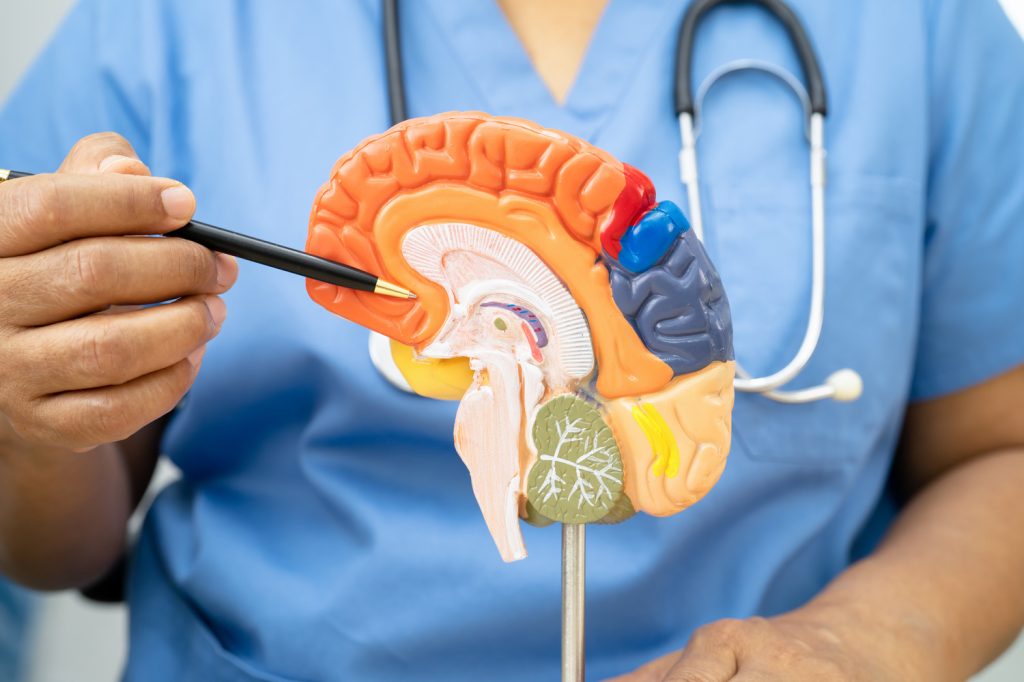Medical Marijuana for Chronic Traumatic Encephalopathy (CTE)
- Nicholas DiBella
- Published: October 15, 2024
- Fact-checked by Dr. Desiree Granados

Medical marijuana has been shown to potentially help manage symptoms of head injury associated with conditions like Chronic Traumatic Encephalopathy (CTE), Traumatic Brain Injury (TBI), and concussions. CTE, a degenerative brain condition caused by repeated head trauma, has few effective treatments. However, early studies suggest that the neuroprotective and anti-inflammatory properties of cannabis could help reduce brain inflammation, ease chronic pain, and improve mood. In this blog, we’ll explore how medical marijuana might offer relief for those with CTE and other head injuries and how you can obtain a medical marijuana card.
Does Marijuana Help With Chronic Traumatic Encephalopathy?
Marijuana has been shown to potentially help people suffering from Chronic Traumatic Encephalopathy (CTE) by alleviating some of the condition’s most debilitating symptoms. The cannabinoids found in cannabis, such as THC and CBD, have neuroprotective and anti-inflammatory properties. These qualities may help reduce the brain inflammation associated with CTE, limit cell death, and slow the progression of tau protein buildup, which is a hallmark of this condition.
The accumulation of tau protein causes damage to brain cells and disrupts their communication, leading to cognitive decline, memory issues, and mood disorders. By reducing inflammation, cannabis might help limit further damage and provide symptomatic relief from chronic pain, mood swings, and anxiety—common issues for individuals with CTE.
Though research is ongoing, early findings suggest that cannabis may offer a natural alternative for managing some symptoms related to CTE, TBI, and concussions, especially when used in conjunction with other treatments.
What Is Chronic Traumatic Encephalopathy and What Are Its Symptoms?
Chronic Traumatic Encephalopathy (CTE) is a degenerative brain condition caused by repeated head injuries, often associated with contact sports, military service, or other high-risk occupations. This condition can result in severe neurological impairments due to cell damage, cell death, and the buildup of tau protein in the brain. This buildup interferes with the normal functioning of the brain, resulting in cognitive, emotional, and physical symptoms.
Symptoms of CTE typically develop years or even decades after the initial head injuries, and they may worsen as the condition progresses. Common symptoms include:
- Memory loss and confusion
- Difficulty concentrating and cognitive decline
- Mood swings, depression, and anxiety
- Impulsive behavior and aggression
- Progressive dementia (in advanced stages)
TBI and concussions, though more acute in nature, can share similar symptoms. A single traumatic brain injury and/or concussion can cause headaches, dizziness, difficulty thinking, and mood changes, while repeated injuries increase the risk of developing long-term neurological conditions like CTE.
Traditional treatments for CTE and TBI are often focused on symptom management, including medications for pain, depression, and cognitive challenges. However, given the limitations and side effects of many conventional treatments, many people are seeking alternative options, including medical marijuana.

Can You Get a Medical Marijuana Card for Chronic Traumatic Encephalopathy?
Individuals experiencing chronic symptoms related to CTE, TBI, and/or concussions may qualify for a medical marijuana card in certain states. Only Ohio lists “chronic traumatic encephalopathy” as a qualifying condition for medical marijuana, but Illinois, New Hampshire, and Washington include “traumatic brain injury” in their lists. Illinois also includes “concussions” as a qualifying condition.
In states such as New York, Virginia, and Washington D.C., doctors are permitted to prescribe medical marijuana to any patient they believe would benefit from the medicine.The Sanctuary Wellness Institute operates in several states where medical marijuana cards are available.
If you are interested in pursuing cannabis as a treatment option, you can learn more about obtaining a medical marijuana card through The Sanctuary Wellness Institute.
How to Use Marijuana for Chronic Traumatic Encephalopathy?
There are several methods of using medical marijuana to manage the symptoms of CTE, TBI, and/or concussions. The right method will depend on your personal needs and preferences, as well as the specific symptoms you are looking to treat.
- Smoking or Vaping: Smoking or vaping cannabis offers rapid relief from acute symptoms such as anxiety, pain, and mood swings. However, those concerned about lung health may prefer other methods.
- Edibles: Edibles like gummies or baked goods provide a slower onset of effects but deliver longer-lasting relief. This can be especially useful for managing chronic pain and inflammation throughout the day.
- Topical Creams: Topical cannabis creams and balms can be applied directly to areas of pain or inflammation, offering localized relief without any psychoactive effects.
- Oils or Tinctures: Tinctures offer a versatile option for individuals who want precise control over their dosage. Taken sublingually, tinctures provide quicker relief than edibles but are still longer-lasting than smoking.
For more information on how to choose between edibles and smoking, check out our guide on Edibles vs. Smoking. It’s important to consult with a medical marijuana doctor who can help you determine the best method and dosage for your specific condition.
What Are the Best Marijuana Strains for Chronic Traumatic Encephalopathy?
Different cannabis strains can provide varying effects, making it essential to choose the right strain based on your symptoms. Here are a few strains that may be helpful for individuals with CTE, TBI, and/or concussions:
- ACDC (CBD-Dominant Hybrid): A high-CBD strain that is effective for reducing inflammation without causing a strong psychoactive effect. This strain may help manage the cognitive issues and mood disorders associated with CTE.
- OG Kush (Hybrid): Known for its relaxing effects, OG Kush may help with pain management and anxiety, offering relief for those experiencing chronic pain and stress from brain injuries.
- Blue Dream (Sativa-Dominant Hybrid): Blue Dream provides a balanced experience, helping with mood stabilization and mental clarity, which can be beneficial for individuals struggling with cognitive decline.
For more information on choosing the right strain, read our Indica vs. Sativa guide to better understand how different strains may suit your needs.
Conclusion
Chronic Traumatic Encephalopathy (CTE) is a serious condition that can have a profound impact on an individual’s quality of life. Although there is no cure for CTE, medical marijuana offers potential relief by managing symptoms such as pain, anxiety, and cognitive decline. If you or someone you know is suffering from CTE, TBI, and/or concussions, obtaining a medical marijuana card may be a viable step towards better symptom management.
At The Sanctuary Wellness Institute, we are committed to helping you navigate the process of obtaining your medical marijuana card. To start your journey, visit our website and schedule an appointment today.
States Where We Offer Medical Marijuana Card Services
How we reviewed this article:
- Danielle C. Hergert, Cidney Robertson-Benta, Veronik Sicard, Daniela Schwotzer, Kent Hutchison, Dan P. Covey, Davin K. Quinn, Joseph R. Sadek, Jacob McDonald, and Andrew R. Mayer (2021). Use of Medical Cannabis to Treat Traumatic Brain Injury
https://www.ncbi.nlm.nih.gov/pmc/articles/PMC8260892/ - Soha Alali, Gholamhossein Riazi, Mohammad Reza Ashrafi-Kooshk, Sogol Meknatkhah, Shahin Ahmadian, Mohammad Hooshyari Ardakani, and Baharak Hosseinkhani (2021). Cannabidiol Inhibits Tau Aggregation In Vitro
https://www.ncbi.nlm.nih.gov/pmc/articles/PMC8700709/ - Atsuko Katsumoto, Hideyuki Takeuchi, and Fumiaki Tanaka (2019). Tau Pathology in Chronic Traumatic Encephalopathy and Alzheimer’s Disease: Similarities and Differences
https://www.ncbi.nlm.nih.gov/pmc/articles/PMC6748163/ - Mayo Clinic (2023). Chronic traumatic encephalopathy
https://www.mayoclinic.org/diseases-conditions/chronic-traumatic-encephalopathy/symptoms-causes/syc-20370921 - Cleveland Clinic (2022). Chronic Traumatic Encephalopathy (CTE)
https://my.clevelandclinic.org/health/diseases/17686-chronic-traumatic-encephalopathy-cte - Leafly (2024). ACDC
https://www.leafly.com/strains/acdc - Leafly (2024). Blue Dream
https://www.leafly.com/strains/blue-dream
Current Version
October 15, 2024
Written By
Nicholas DiBella
Fact-checked By
Dr. Desiree Granados
Editorial Process
Our Editorial Process

Nicholas DiBella received his psychology degree from West Chester University of Pennsylvania and has been writing content for the Sanctuary Wellness Institute since 2023. He is passionate about all things health & wellness.







